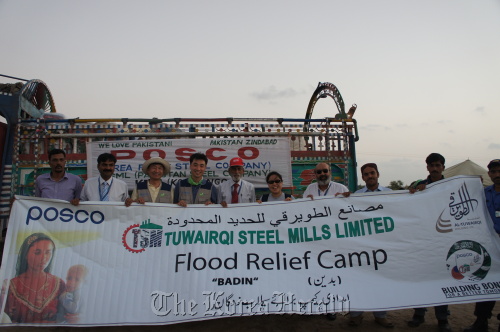Korean firms look to create social impact via education, donations and volunteering
These days, the concept of “giving back” among businesses is not rare.
With an increasing number of Korean firms going global, their responsibility to the community stretches beyond their home turf.
POSCO opened foster care centers and agricultural training facilities in Africa. Samsung Electronics nurtures engineers in the Middle East and India. Hyundai Motor backs China’s fight against desertification and pediatric cancer patients in the United States. Shinhan Bank provides micro-financing services in Cambodia.
While large corporations step up their campaigns around the world, smaller players are also trying to catch up with the trend. Booyoung, a construction-focused corporation, build schools Sri Lanka. Youngone, a clothing firm, helps Bangladesh rebuild cultural sites, while Samick Music Instrument donates pianos in Indonesia, among others.
Such activities mean more than a public relations task aimed at maximizing profits or protecting stakeholder interests, the companies say, but demonstrate their commitment to building a better society.
 |
POSCO employees pose at a flood relief camp in Pakistan where they provided essential supplies for workers at the company’s affiliate Tuwairqi Steel Mills in late September. (POSCO) |
“Our mission is to become a company loved by society,” POSCO chairman Chung Joon-yang declared last year. “The company has reached a decent level of profit. But what we need is more efforts in environmental health and social work.”
Corporate social responsibility hit the headlines last year as criticism mounts that foreign enterprises operating here make little to no donations while meting out hefty dividends to their shareholders back home.
That, on the other hand, provided many local entrepreneurs with a mirror of what may be exactly happening to them in their overseas bases.
“CSR can be a double-edged sword,” says Kwak Bok-sun, director of the Korea Trade-Investment Promotion Agency’s China research unit.
“Firms need to promote their campaigns through whether media or community groups to let their message to be heard. But if they focus too much on marketing, all the efforts could boomerang on them ― they need cautious strategies.”
Last month, some 8,000 workers at one of LG Display’s three plants in China staged a three-day strike. In a video clip, some union members brought down a giant Christmas tree in front of the factory in Nanjing, demanding better compensation and fairer treatment.
Korea’s leading display maker settled the dispute after agreeing to double the year-end bonus to about 3,000 yuan ($475).
Kwak finds the root cause of the incident from the lack of communication between management and employees. Some experts, however, say it could epitomize the poor working environments and hardships many workers face in a country whose ample supply of cheap labor is among its best assets, a major attraction for foreign investors.
“Korean businesses need to recognize that pay raises are no panacea,” says Mark Yoo, founder and chief executive of Korea CSR, a specialized consulting firm.
“To boost employee satisfaction and royalty, they should not alone understand local regulations and culture but also open communications and share information on the company’s vision and strategy with the staff.”
In addition, a majority of companies ― small ones in particular ― tend to focus on showing off their campaigns that come around the year-end holiday season through a one-off donation or volunteer work, reports show.
According to a study by Lee Su-yol, a business professor at Chonnam National University, merely about a quarter of the country’s 62 major public and private enterprises have laid out a long-term CSR framework.
Another survey by KOTRA on 210 small and large firms operating abroad shows that 60 percent of the respondents said they had not participated in any social contribution initiative.
More notably, nearly 40 percent said they were not familiar with the idea or never heard of.
“A considerable number of local companies still see CSR as a zero-sum game,” says Shin Won-moo, a senior researcher at LG Economic Research Institute, a private think tank in Seoul.
“That inevitably confines their activities to a simple method of managing reputation or brand value, thus lacking goals and heavily focusing on coping with regulations in each country.”
What matters is long-term commitment and trust, rather than the size of the donation, for companies to firm up their footing in the market, Kwak says.
“Some SMEs and startups may find it difficult to spend extra money when their business in hand deteriorates. But keep it in mind that small, regular contributions become a huge asset in the long term for the corporate image, and ultimately for Korea.”.
By Shin Hyon-hee (
heeshin@heraldcorp.com)








